- Latest articles
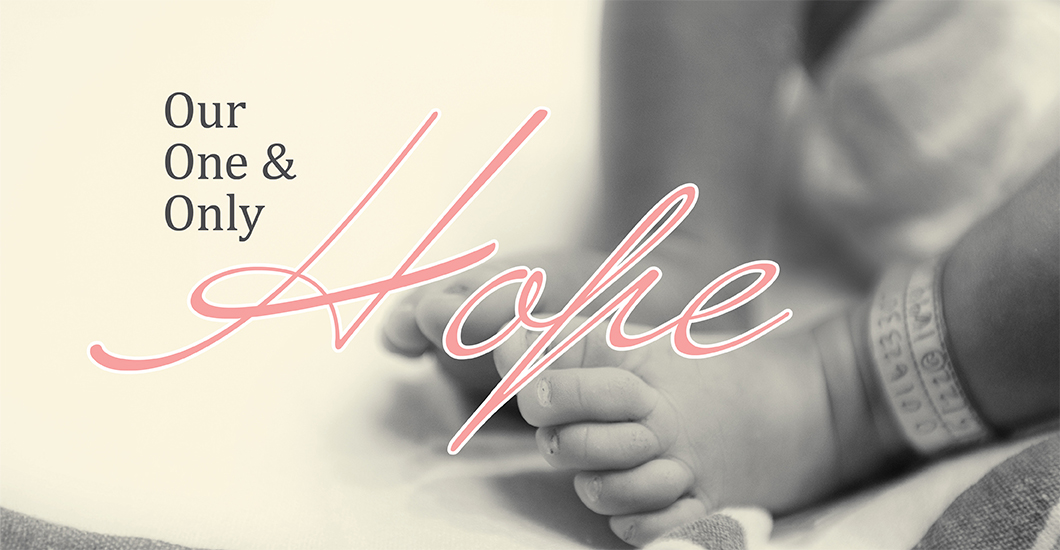
Ecstatic over the good news of a much-awaited pregnancy, their world turned upside down during the 12th-week routine ultrasound.
Our first-born Mary Grace was growing up to be a beautiful child. Our family and friends had been actively praying for us to have another baby, so we were overjoyed to learn about the pregnancy! The genetic testing returned normal results, and we decided to keep the gender a lovely surprise.
When I went for the routine 12th-week ultrasound, the technician showed me the side profile of the baby and then quickly turned the screen away from me. They took my daughter out, and I immediately knew something was wrong. I thought: “Maybe the baby has some sort of heart problem or defect, but it is alright. God can fix anything, and we can have surgery.” But being a doctor, I prayed: “Please God, don’t let it be anencephaly.” Since I had had a glimpse of the ultrasound, I felt confident it would be something else.
As the doctor came into the room, I asked: “Please tell me the baby is alive.” With a solemn face, she said: “Yes, the baby does have a heartbeat, but it doesn’t look good.” I started crying and called my husband on Facetime. It was what I feared the most—our baby has anencephaly, one of the severe defects a baby can have in utero where the skull does not develop appropriately—and the doctor told me the fetus wouldn’t live long.
It was heartbreaking. This precious child that we had been waiting for so many years was not going to live! I thought about how excited my older daughter was. In our daily family prayer, she used to say: “Jesus, please let me have a baby brother or sister.” I kept saying in my mind: “Lord, you can heal, you can heal the baby.”
My husband immediately came down. Trying hard to keep a straight face, I told my daughter that I was crying tears of joy. What else could I say?
The doctor said we could terminate the pregnancy. I said, “Absolutely no way. I am going to carry the baby until he/she lives. If it’s going to be 40 weeks, it’s 40 weeks.” She did warn me that I would likely not make it that long, and in case the baby dies in the womb, there was the possibility of me getting a severe blood infection. I also needed frequent checkups as fluid build-up in my uterus could be very dangerous. I told her that I was ready to face anything. Thankfully, I wasn’t pressured further, even on the following visits. They knew that I had made my decision!
Destined for Hope
We came home and spent time praying and crying together. I called my sister, who was an OBGYN resident. She called a lot of friends, especially in Jesus Youth, and started a Zoom Novena that very night. We just said to our daughter that the baby has “a little bit of a booboo, but it’s okay.” We didn’t tell our parents or in-laws; my sister was to get married in a month, and we didn’t want the wedding to be affected. We also had this thought that they wouldn’t handle it with the same strength we felt.
The first few days, many people talked to me, helping me trust in God’s providence and believe that He doesn’t do anything that’s not good for us. I felt immense peace. I thought about Mother Mary—the joy of receiving the good news at Annunciation and the later sorrow at knowing that He was going to die. We decided, that day, to open the card from the blood tests that revealed the gender because by then, we wanted to pray for the baby with a name.
We named her Evangeline Hope, meaning ‘the bearer of good news’ because, for us, she still radiated the hope of Christ’s love and mercy. Not once did we consider aborting her because she was such good news, not only for us but for all our well-wishers—a child who would evangelize the world in many ways.
I joined an Anencephaly Support group, which helped me immensely in my journey. I met many people, even atheists, who deeply regretted their decision to abort their babies. I was brought in contact with ladies who sewed angel gowns from donated wedding gowns and professional photographers who volunteered to document the birth through beautiful photos.
We did a gender reveal at our sister’s wedding but still didn’t tell anyone that the baby was sick. We just wanted to honor and celebrate her little life. My sister and friends also organized a beautiful baby shower (more like a celebration of life), and instead of presents, everyone wrote letters to her for us to read after the delivery.
Perpetual Adorer
I carried her until the 37th week.
Even after a complicated delivery, including a uterine wall rupture, Evangeline was not born alive. But somehow, I remember feeling a deep sense of Heavenly peace. She was welcomed with so much love, dignity, and honor. A priest and her Godparents were waiting to meet Evangeline. There in the hospital room, we had a beautiful time of prayer, praise, and worship.
We had beautiful dresses for her. We read the letters that everybody wrote to her. We wanted to treat her with more dignity and honor than a ‘normal’ child. We cried because we missed her presence, and also because of joy as she was with Jesus now. In that hospital room, we were thinking, “Wow, I can’t wait to get to Heaven. Let’s do our best to be there with all the Saints.”
Two days later, we had a ‘celebration of life’ for her with everybody wearing white. The Mass was celebrated by four priests, and we had three seminarians and a beautiful choir honoring our precious baby. Evangeline was buried in the Angels section for babies in the cemetery, which we still visit often. Although she isn’t here on earth, she is very much a part of our lives. I feel closer to Jesus because I see just how much God loves me and how He chose me to bear her.
I feel honored. She is a perpetual adorer for our family to bring us to sainthood in a way no other situation could ever bring us to. It was sheer grace from God and full acceptance of His will that gave us the strength to go through this. When we accept God’s will, He showers the graces that we need to go through any given situation. All we have to do is abandon ourselves to His providence.
Raising Saints
Every unborn child is precious; healthy or sick, they are still gifts from God. We should open our hearts to love these children made in the image of Christ, who are in my view more precious than a “normal” child. Taking care of them is like taking care of the wounded Christ. It’s an honor to have a child with disabilities or special needs because caring for them will help us reach a deeper state of sanctity than accomplishing anything else in life. If we can see these sick unborn children as gifts—pure souls—it wouldn’t even feel like a burden. You will be raising within you, a Saint who will be seated beside all the angels and Saints.
Our youngest baby boy Gabriel was born last October. As we awaited him, we used to pray that even if he is diagnosed with something, we would still have the grace to receive him with open hearts and arms. Thanks be to God, it was His will that Gabriel be born a beautiful healthy baby; and an added thanks to his sister’s intercession from heaven too.
All life is a precious gift, and we are not the authors of life. We must always remember that God gives, and God takes. Blessed be the name of the Lord!
'The Scripture read at Mass always sounded beautiful to my ears as a young girl. However, as it was confusing, I put it amongst the “too hard” pile of things to comprehend, thereby categorizing all of Scripture as a mystery that someday will be explained when I’m in heaven with God.
Later, as a young adult, I heard a life-changing quote by Saint Jerome: “Ignorance of Scripture is ignorance of Christ.” Saint Jerome was telling me that I didn’t have to wait for “someday.” Instead, I had God’s permission to understand and know Christ at this very moment.
My journey into God’s word was like assembling a puzzle that became clearer as the pieces were put into place. Scripture, especially John’s Gospel, reveals that the Almighty Word of God, creator of everything, became flesh because He loved me. As a part of His creation, He wants me to be His daughter, to inherit His Kingdom, and to live with Him in peace for eternity.
However, the King of Glory humbly chose to take on flesh as an infant, suffered, and died on the cross for me to achieve His plan. With each turn of the page, the veil of ignorance becomes lifted while my faith and love for Him grow; I now know that I belong to Him.
With the help of the Holy Spirit, I try to encourage others not to be ignorant of Christ because of a lack of understanding of the Scripture. For many years, my husband and I have been the coordinators of the Scripture study program at our parish in the hope of drawing others to The Word of God and coming to know Jesus, the Son of God, made flesh.
'
Baby Jesus, peacefully nestling in His parents’ hands…it’s a beautiful image that has been reproduced in so many forms over the centuries. My personal favorite is a sleeping Mary with Joseph by the side, lovingly looking at the child in his arms.
Throughout the scary journey to an unknown land, Mary and Joseph would have done all they could to make sure that the baby they held close felt safe. They knew that this was The Savior who had come to save the world, and so, in spite of all the struggles, they sacrificed their joys for the child.
Jesus taught us to see Him in the person next to us. In fact, didn’t He come down to raise us to Him?
Every Advent, I am posed with the challenge of seeing Christ in others.
When I look at the person next to me, I wish I could see beyond the surface–his/her color, race, position, power, ugly scars, to reveal the true beauty within—the image of the Savior reflected deep within their soul. What helps me is to first take a look at myself, to recognize my weaknesses and sinful ways, and be amazed at the fact that God still loves me. If He can see beyond all these, to the possibility of who He created me to be, He can surely help me see the same Christ-like beauty in my fellow brethren.
'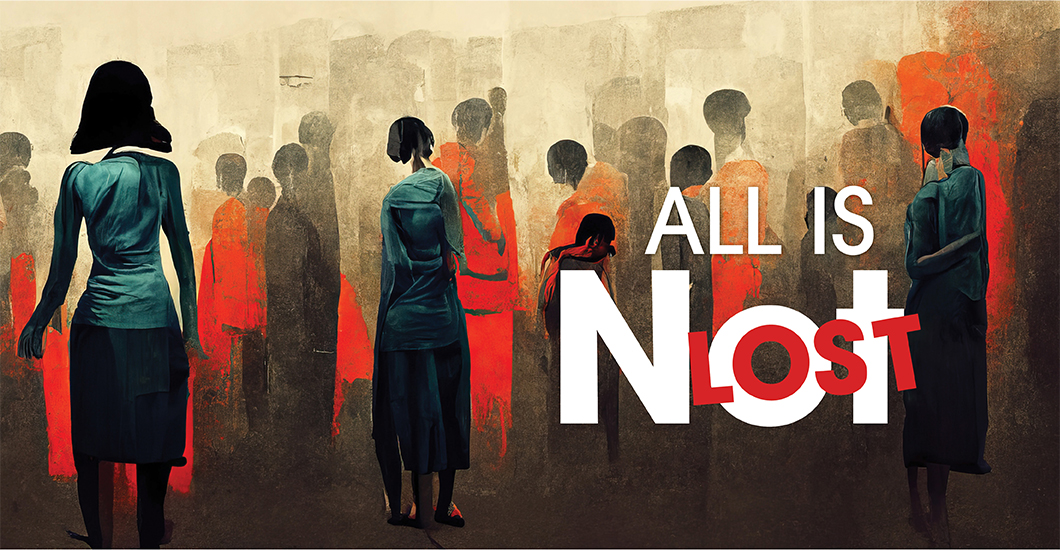
At the age of six, a little girl decided she did not like the words ‘prison’ and ‘hanged’. Little did she know that at the age of 36, she would be walking with death-row prisoners.
In 1981, the shocking murders of two young children became front-page news in Singapore and around the world. Investigation led to the arrest of Adrian Lim, a medium who had sexually abused, extorted, and controlled a string of clients by fooling them into believing that he had supernatural powers, torturing them with electro-shock ‘therapy.’ One of them, Catherine, had been a student of mine who had gone to him to be treated for depression after her grandmother’s death. He had prostituted her and abused her siblings. When I heard that she was charged with participating in the murders, I sent her a letter and a beautiful picture of the Sacred Heart of Jesus.
Six months later, she wrote back, asking, “How can you love me when I have done such bad things?” For the next seven years, I visited Catherine weekly in prison. After months of praying together, she wanted to ask forgiveness from God and all the people that she had hurt. After she had confessed her sins, she had such peace, she was like a different person. When I witnessed her conversion, I was beside myself with joy, but my ministry to prisoners was just beginning!
Tracing Back
I grew up in a loving Catholic family with 10 children. Every morning, we would all go to Mass together, and my mother would reward us with breakfast in a coffee shop near the church. But after a while, it stopped being about food for the body and became solely about nourishment for the soul. I can trace my love for the Eucharist to those early morning Masses with my family where the seed of my vocation was sown.
My father made every one of us feel especially loved, and we never failed to run joyfully into his arms on his return from work. During the war, when we had to flee Singapore, he would home-school us. He’d teach us phonetics every morning, asking us to repeat a passage in which someone was sentenced to death at Sing Sing prison. At the tender age of six, I already knew that I didn’t like that passage. When it was my turn, instead of reading it, I recited the Hail Holy Queen. Little did I know that I would one day be praying with prisoners.
It’s Never Too Late
When I began visiting Catherine in prison, several other prisoners showed interest in what we were doing. Whenever a prisoner requested a visit, I was glad to meet with them and share God’s loving mercy. God is a loving Father who is always waiting for us to repent and turn back to Him. A prisoner who has broken the law is similar to the Prodigal Son, who came to his senses when he reached rock bottom and realized, “I can go back to my Father.” When he returned to his Father, asking for forgiveness, the Father came running out to welcome him back. It is never too late for anyone to repent of their sins and turn back to God.
Embracing Love
Flor, a Filipino woman accused of murder, learned about our ministry from other prisoners, so I visited her and supported her as she appealed her death sentence. After the rejection of her appeal, she was very angry with God and wanted nothing to do with me. When I passed her door, I would tell her that God still loved her no matter what, but she sat in despair staring at the blank wall. I asked my prayer group to pray the Novena to Our Lady of Perpetual Succour and offer their sufferings specifically for her. Two weeks later, Flor had a sudden change of heart and asked me to come back with a priest. She was bubbling over joy because Mother Mary had visited her cell, telling her not to be afraid because she would stay with her until the end. From that moment, until the day of her death, there was only joy in her heart.
Another memorable inmate was an Australian man who was imprisoned for drug trafficking. When he heard me singing a hymn to Our Lady to another prisoner, he was so touched that he asked me to visit him regularly. His mother even stayed with us when she came to visit from Australia. Eventually, he also asked to be baptized as a Catholic. From that day on, he was full of joy, even as he walked to the gallows. The superintendent there was a young man, and as this former drug dealer walked to his death, this officer came forward and embraced him. It was so unusual, and we felt it was like the Lord Himself embracing this young man. You just can’t help but feel God’s presence there.
In fact, I know that every time, Mother Mary and Jesus are there to receive them into heaven. It has been a joy for me to truly believe that the Lord who called me has been faithful to me. The joy of living for Him and for His people has been far more rewarding than anything else.
'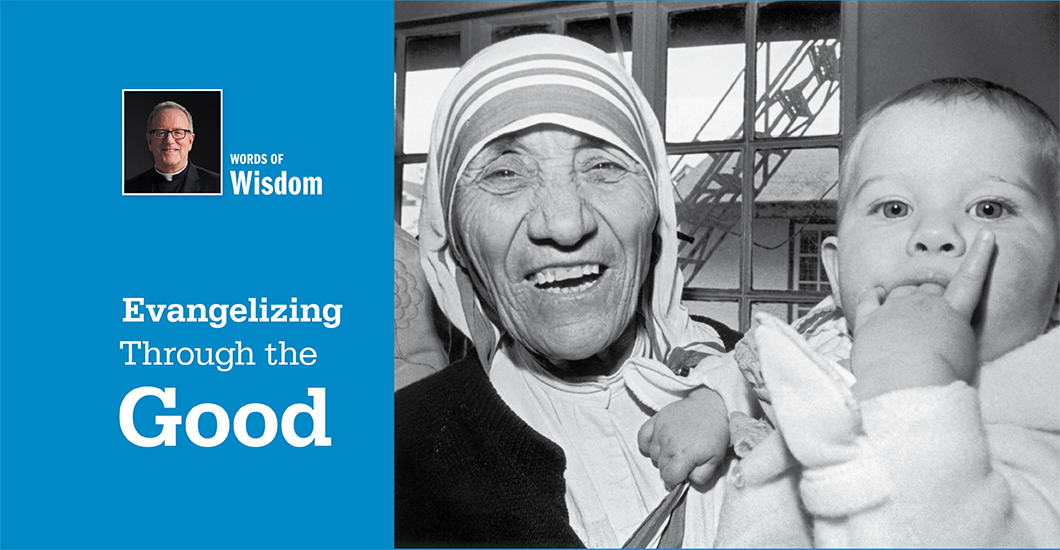
Anyone even vaguely acquainted with my work knows that I advocate vigorous arguments on behalf of religious truth. I have long called for a revival in what is classically known as apologetics, the defense of the claims of faith against skeptical opponents. And I have repeatedly weighed in against a dumbed-down Catholicism. Also, I have, for many years, emphasized the importance of beauty in the service of evangelization. The Sistine Chapel Ceiling, the Sainte Chapelle, Dante’s Divine Comedy, Bach’s St. Matthew’s Passion, T.S. Eliot’s Four Quartets, and the Cathedral of Chartres all have extraordinary convincing power, in many ways surpassing that of formal arguments. So I affirm the path of truth and the path of beauty. But I also recommend, as a means of propagating the faith, the third of the transcendentals, namely, the good. Moral rectitude, the concrete living out of the Christian way, especially when it is done in a heroic manner, can move even the most hardened unbeliever to faith, and the truth of this principle has been proven again and again over the centuries.
In the earliest days of the Christian movement, when both Jews and Greeks looked upon the nascent faith as either scandalous or irrational, it was the moral goodness of the followers of Jesus that brought many to belief. The Church father Tertullian conveyed the wondering pagan reaction to the early Church in his famous adage: “How these Christians love one another!” At a time when the exposure of malformed infants was commonplace, when the poor and the sick were often left to their own devices, and when murderous revenge was a matter of course, the early Christians cared for unwanted babies, gave succor to the sick and the dying, and endeavored to forgive the persecutors of the faith. And this goodness extended not simply to their own brothers and sisters but, astonishingly, to outsiders and to enemies. This peculiarly excessive form of moral decency convinced many people that something strange was afoot among these disciples of Jesus, something splendid and rare. It compelled them to take a deeper look.
During the cultural and political chaos following the collapse of the Roman Empire, certain spiritual athletes took to the caves, deserts, and hills in order to live a radical form of the Christian life. From these early ascetics, monasticism emerged, a spiritual movement that led, in time, to the re-civilization of Europe. What so many found fascinating was the sheer intensity of the monks’ commitment, their embrace of poverty, and their blithe trust in divine providence. Once again, it was the living out of the Gospel ideal that proved convincing. Something similar unfolded in the thirteenth century, a time of significant corruption in the Church, especially among the clergy. Francis, Dominic, and their confreres inaugurated the mendicant orders, which is just a fancy way of saying the begging orders. The trust, simplicity, service to the poor, and moral innocence of the Dominicans and Franciscans produced a revolution in the Church and effectively re-evangelized armies of Christians who had grown slack and indifferent in their faith.
And we find the same dynamic in our time. John Paul II was the second most powerful evangelist of the twentieth century, but unquestionably the first was a woman who never wrote a major work of theology or apologetics, who never engaged skeptics in public debate, and who never produced a beautiful work of religious art. I’m speaking, of course, of St. Teresa of Kolkata. No one in the last one hundred years propagated the Christian faith more effectively than a simple nun who lived in utter poverty and who dedicated herself to the service of the most neglected people in our society.
There is a wonderful story told of a young man named Gregory, who came to the great Origen of Alexandria in order to learn the fundamentals of Christian doctrine. Origen said to him, “First come and share the life of our community and then you will understand our dogma.” The youthful Gregory took that advice, came in time to embrace the Christian faith in its fullness, and is now known to history as St. Gregory the Wonderworker. Something of the same impulse lay behind Gerard Manley Hopkins’s word to a confrere who was struggling to accept the truths of Christianity. The Jesuit poet did not instruct his colleague to read a book or consult an argument but rather, “Give alms.” The living of the Christian thing has persuasive power.
We have been passing through one of the darkest chapters in recent Church history. The clerical sex abuse scandals have chased countless people away from Catholicism, and a secularist tide continues to rise, especially among the young. My mentor, the late great Cardinal George, surveying this scene, used to say, “I’m looking for the orders; I’m looking for the movements.” He meant, I think that in times of crisis, the Holy Spirit tends to raise up men and women outstanding in holiness who endeavor to live out the Gospel in a radical and public way. Once again, I’m convinced that, at this moment, we need good arguments, but I’m even more convinced that we need saints.
'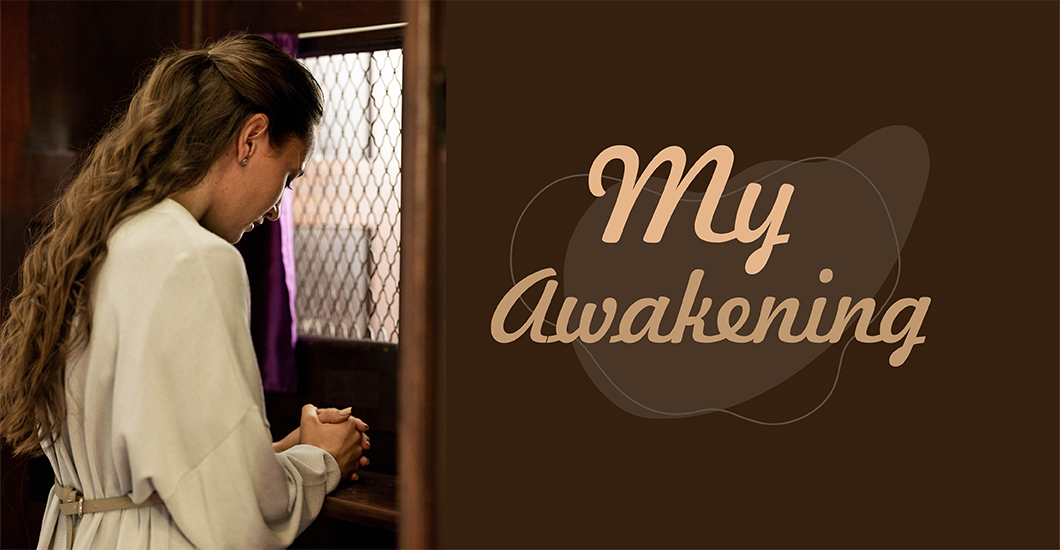
Can a thought become a sin? It’s time to reflect.
As long back as I can remember, I had been a good Christian, going to Church regularly and getting involved in Church activities, but nobody could guess that I was simply going through the motions. In 2010 however, an incident shook me to the core and led me to hear the voice of God amidst the anguish. This revelation helped me begin my journey to becoming a true Christian.
Unforgettable Night
Veronica and I were not the best of friends; we hung out together because our boys brought us together. But we were friends who genuinely liked each other and mothers who loved our children. She was sweet, beautiful, and a genuinely kind person. My son was her son’s best friend.
On August 28, 2010, Veronica called me and asked if my son could spend the night at her house. Though I had allowed him to, dozens of times before, that night, for some reason, I was uneasy. I told her no, but that he could go over and play for the afternoon and that I would pick him up before dinner. Around 4 o’clock, I drove over to her house to pick him up. As I stood in Veronica’s kitchen area and chatted about our boys, she told me how each of them had a gift and what special children they were. She had taken them to the grocery store to buy their favorite ice cream. My son also wanted cereal, which she generously bought for him and gave me to take home for him. I thanked her and drove away.
The next morning, I woke up to the news that she had been murdered. Right there, where I had stood talking to her the evening before…Her soon-to-be ex-husband had hired a hitman to murder her because they were separated, and really who knows why else. I felt like I’d been punched in the stomach. I couldn’t breathe. I couldn’t stop crying.
In my agony, I lay on my bedroom floor crying, wailing really. A beautiful young mother, 39 years old, murdered, leaving behind her 8-year-old son motherless. And for what? I cried out to God in anguish and anger. How could You let this happen? Why Lord?
In the midst of my anguish, a thought came over me. And for the first time in my life, I recognized this thought as the voice of God. God said, “I don’t want this; people choose this.” I asked God, “What, what in the world can I do in this awful place?” He answered me, “Susan, good in the world starts with you.” I began to think. I thought about how I had seen Veronica and her husband in church together, and I wondered how a person who was plotting murder could even attend church. God answered me again.
He told me that her husband did not start out as a murderer but that his sin had grown in his heart, gone unchecked, and he had been led down a long dark path. I remembered the Bible verse, “But I tell you that anyone who looks at a woman lustfully has already committed adultery with her in his heart” (Matthew 5:28). That moment, this verse made sense to me. I had always thought, “How can a thought be a sin?” After Veronica’s murder, it all made sense to me. Sin starts in your heart and takes over once you act on it with your hands. And if we never take the time to examine our conscience or think about what is right and what is wrong, chances are, we can really go down a wrong path.
Resounding Voice
So Lord, “What can I do?” He told me that the only person I could control was myself—that I could choose to love and spread that love outward. For me, this meant examining my own conscience and trying to become a better person. Did I love my enemy? Or even my neighbor, for that matter? The answer, unfortunately, was a resounding NO. I was dismayed when I realized I had not been loving towards the people around me.
In the Catholic Church, we have the Sacrament of Confession, where we go to a priest and confess our sins. I had always disliked this Sacrament and dreaded going for it. But here, in this place, crying on the ground, I found it to be a gift. A gift I was actually grateful for. In telling my sins, I was able to encounter Christ. I had a confession like I had never had before. In this Sacrament, I received the grace that Jesus offers to us when we choose to ask for it. I took a good hard look at myself, and my selfishness started to burn away because of my encounter with God’s unconditional love at the confessional. The Sacrament makes me try to do better, and though I know that I am a sinner and will continue to have failures, I can always look to receiving His sanctifying grace and forgiveness no matter what. This helps me to spread His goodness forward. I don’t think you have to be a Catholic to understand this.
Veronica’s murder was not my fault, but I would definitely not let her die in vain; I would not let her life be snuffed out without letting others know the impact it had on me and that good could come out of the ashes of such awful circumstances. Thus, my journey toward being truly Christian began.
I thought of Veronica in the Bible. While Jesus suffered during His Passion, making His way to Golgotha, bloodied and beaten, He came across a woman also named Veronica. Veronica wiped the face of Jesus. A small act of kindness. This man, this God-man, was bloodied, beaten, tired, and in agony, yet this woman, Veronica, provided a brief respite. A few seconds where the sweat and blood were wiped away, and for a moment, however short, he felt love from this woman. It did not stop His Passion nor His suffering, but in a world that was mocking Him, scourging Him, that woman’s touch with the cloth must have felt glorious. So, He imprinted His image on her cloth.
The name “Veronica” means “True Image.” Jesus left Veronica the mark of His love. And so, because of my friend, Veronica, who also provided me with love and respite during a tough time in my life, I must spread love and kindness wherever I go. I cannot stop suffering, but I can offer that respite to those who are lost, poor, lonely, unwanted, or unloved. And so, for me, I will wipe the Face of Jesus for as long as His grace and mercy allow me to.
'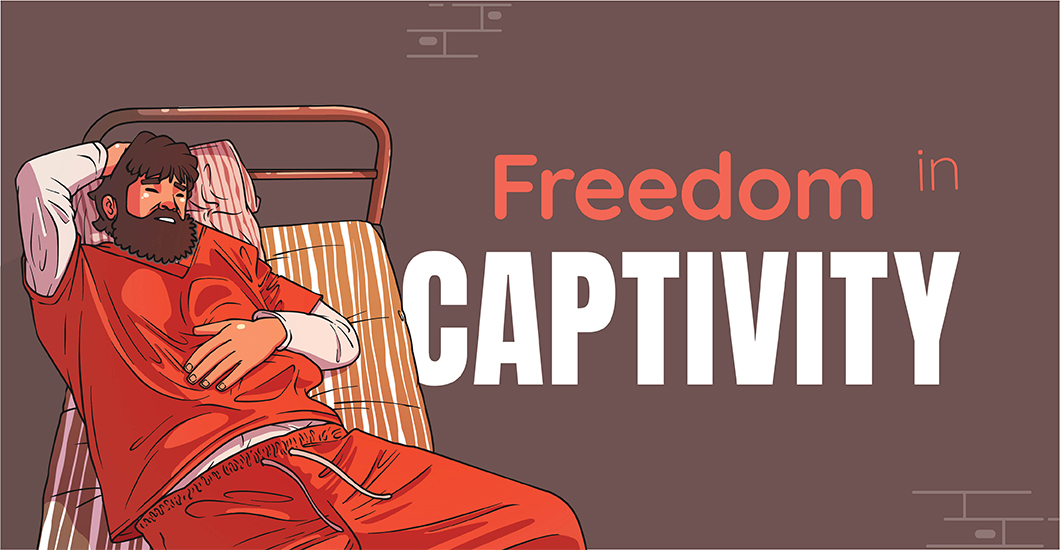
Blessings were abundant: friends, family, money, vacations—you name it, I had it all. So how did it all go so wrong?
I didn’t really have a wonderful storybook childhood—tell me someone who has—but I wouldn’t say it was terrible. There was always food on the table, clothes on my back, and a roof over my head, but we struggled. I don’t just mean we struggled financially, which we definitely did, but I mean we struggled to find our way as a family. My parents were divorced by the time I was six, and my father turned to heavier drinking than ever before. Meanwhile, my mother found men who were into the same drugs and habits as she was.
Though we had a rough start, it didn’t stay that way. Eventually, against all statistical odds, both of my parents and my now stepfather, by the grace of God, got sober and have stayed that way. Relationships were rebuilt, and the sun began to rise in our lives again.
A few years went by, and there came a point when I realized that I had to do something productive and different in my life so that I could avoid all of the pitfalls of my childhood. I buckled down and went back to school. I got my barber’s license and worked myself into a nice career. I made plenty of money and met the woman of my dreams. The opportunity eventually arose, and I started a second career in law enforcement in addition to cutting hair. Everyone liked me, I had friends in very high places, and it looked as if the sky was the limit.
So how’d I end up in prison?
Unbelievably True
Wait a minute, this isn’t my life…this can’t be real…HOW IS THIS HAPPENING TO ME?! You see, despite everything I had, I was missing something. The worst part of it was that I knew all along exactly what that something was, and I ignored it. It’s not like I didn’t ever try, but I just couldn’t give God my everything. Instead, I lost it all…or did I?
This is how it is: Whatever sin you’re holding onto will eventually work its roots deep down into the core of your soul and choke you out until you can’t breathe anymore. Even seemingly insignificant sins demand more of you, little by little, until your life is upside down, and you’re so disoriented that you don’t know which way is up.
That’s how it started for me. I began giving in to my lustful thoughts somewhere around middle school. By the time I was in college, I was a full-fledged womanizer. When I did finally meet the woman of my dreams, there was no way I could ever do what was right anymore. How could someone like me be faithful?
But that’s not all.
For a while, I tried to go to Mass and do all the right things. I went to confession regularly and joined clubs and committees, but I always kept just a little bit of my old sins for myself. It’s not necessarily that I wanted to, but I was so attached, and I was afraid to let go.
Time went on, and I slowly stopped going to Mass. My old sinful ways began to fester and creep back into the forefront of my life. Time moved fast, and pleasures swirled all around me as I threw caution to the wind. I was high on life. On top of it all, I was very successful and admired by many. Then it all came crashing down. I made some terrible choices that left me serving a 30-year prison sentence. More importantly, I left behind people who loved and cared for me with a lifetime of pain.
You see, sin has a way of convincing you to go further than you’ve gone and making you more depraved than you once were. Your moral compass becomes confused. Worse things seem more exciting, and the old sins don’t cut it anymore. Before you know it, you’ve become someone you don’t even recognize.
Fast forward to the present day…
I live in an 11×9 ft. cell, and I spend twenty-two hours a day locked inside of it. There is chaos all around me. This is not how I imagined my life would turn out.
But, I found God within these walls.
I have spent the last few years here in prison praying and seeking the help I needed. I have been studying Scripture and taking lots of classes. I’ve also been sharing the message of God’s mercy and peace with all the other inmates who will listen to me.
It took an extreme wake-up call before I finally surrendered to God, but now that I have, my life has been totally different. I wake up every morning thankful to be alive. I am grateful every day for the shower of blessings that I receive despite my incarceration. For the first time in my life, I experienced peace in my soul. It took me losing my physical liberty to find my spiritual freedom.
You don’t have to go to prison to find and accept God’s peace. He will meet you wherever you are, but let me warn you—if you hold anything back from Him, you may very well end up being my neighbor in prison.
If you recognize yourself in this story, please don’t wait to seek professional help and guidance, starting from, but not limited to, your local parish priest. There is no shame in admitting you have a problem, and there is no better time than NOW to get help.
If you’re in prison and you’re reading this, I want you to know that it’s not too late for you. God loves you. He can forgive whatever it is you’ve done. Jesus Christ shed His precious blood to forgive all of us who come to Him with our pain and our brokenness. You can start right now, this very moment, by recognizing that you are powerless without Him. Cry out to Him with the words of the tax collector: “O God, be merciful to me, a sinner” (Luke 18:13).
I leave you with this: “What profit would there be for one to gain the whole world and forfeit his life?” (Matthew. 16:26)
'
On life’s winding journey, it’s interesting to know that there are blind spots to look out for!
We know how important it is to check our car’s blind spots, especially before changing lanes, reversing, or turning. Unfortunately, we learn the hard way sometimes.
Lately, I’ve been struck with the notion that we all possess physical and spiritual blind spots. Jesus taught us to be wary of the latter when He said, “I have come into this world, so that the blind will see and those who see will become blind.” Some Pharisees who were with Him heard Him say this and asked, “What? Are we blind too?” Jesus said, “If you were blind, you would not be guilty of sin; but now that you claim you can see, your guilt remains” (John 9:39-41). What is Jesus telling us here?
We need to be very careful that we stay sitting at Jesus’ feet, heeding His instruction, learning from Him, and staying open to His corrections. As soon as we think we have ‘arrived’ or ‘have this Christian lifestyle down,’ we’re in dangerous territory. Our wisest thoughts, greatest sacrifices, and deepest loves are mere breaths compared to God’s infinite loving wisdom.
For we only see partially; we do not see the whole picture, the master plan. Only God does. Saint Paul puts it like this, “Now we see only a reflection as in a mirror, then we shall see face to face. Now I know in part; then I shall know fully, even as I am fully known” (1 Corinthians 13:12).
Learning the Hard Way
Looking back on my life, I recall that I was completely unaware of my pride, sins, shortcomings, judgments, presumptions, biases, fears, and lack of trust more times than one. Thankfully, God introduced people and events into my life, which helped uncover some of these areas of spiritual blindness.
I tend to learn the hard way. For years, I couldn’t quite put my finger on why one woman actively avoided me. It created a lot of tension, as we were in the same play-and-pray group. Eventually, I got the courage and humility to ask how I had offended her. The answer hurt like the dickens, and although we never became friends, at least now I am aware of one of my blind spots that were previously under the radar.
It takes a humble heart to allow people to remove splinters from our eyes. And our trouble is, we are not often humble enough.
There are many instances in my life when I was unaware of the harm that my unforgiveness, pride, need to control, tolerance for sin, or lack of gratitude caused. I do not wish to make a public confession here, but God has slowly been peeling off layers of spiritual blindness from me. Although it can be painful, I have gained greater spiritual freedom.
More to Learn Every Day
A wise friend once told me that she looks forward to Lent each year. I have never been one of those holy souls, so my ears perked up when she said that. She told me that she does not choose what she gives up or does for Lent. She lets her husband do that for her. I was absolutely floored by that concept.
What if we went to our spouse or a trusted fellow Christian and asked them how we could grow spiritually or what sinful habit we should confess?
So many times, our root sin is buried under more obvious issues. For instance, anger might be due to unforgiveness, worry might stem from the need to control, and perfectionism often involves pride. Most sins stem from a lack of trust in God’s goodness.
The Power of Direction
There is a real power that comes with being able to name your root sin. If you can identify it, you can repent and be free of it. However, root sins are tricky; they like to stay buried. A good regular confessor or spiritual director is a huge help. “Oh, if only I had had a spiritual director from the beginning, then I would not have wasted so many of God’s graces,” wrote Saint Faustina.
We can seek out accountability partners. God often uses other people to help us ‘see’ ourselves better. Family members, especially those who are actively following Christ, can be great blind spot checkers, as they see us at our best and our worst. And let’s not forget to simply ask God to reveal our blind spots to us.
What if we prepared for confession by asking the Holy Spirit to reveal an area of sin that we are oblivious to or ignoring? What if we did the same at the end of each day?
I particularly recommend seeking the advice of wise Christians before making big decisions. Just as it’s more important to check blind spots when we are planning to set out or change direction in a vehicle, we need to be extra careful to do the same when we are discerning our vocations, career choices, and other major life decisions.
Heavenly Father, give us humble, listening hearts so that You can change us for the better. Grant us Your vision to grow in our love for You and for our neighbors.
'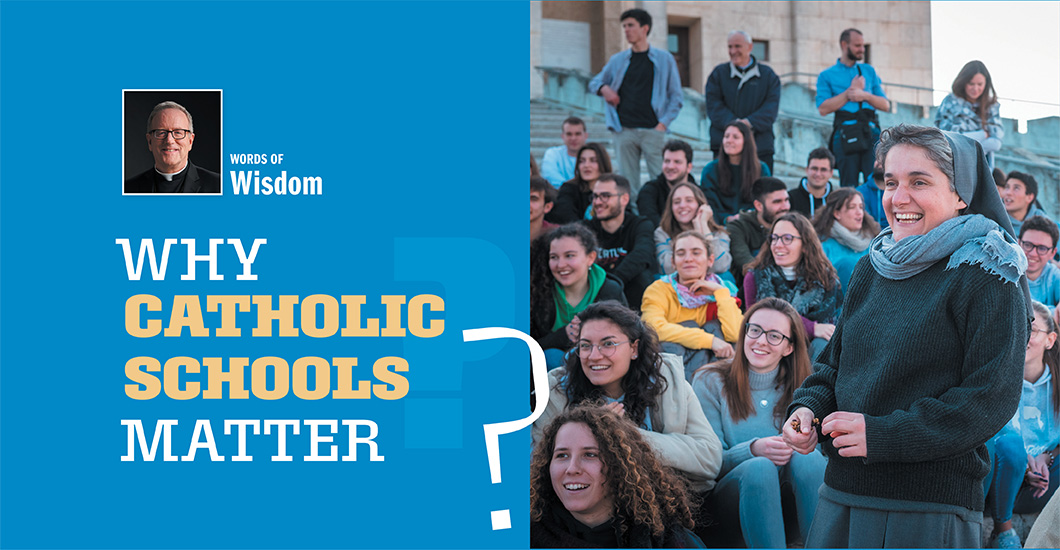
At the beginning of February, the Church in the United States celebrates Catholic Schools Week. I would like to take this opportunity to sing the praises of Catholic schools and to invite everyone—Catholic and non-Catholic alike—to support them. I attended Church-affiliated educational institutions from first grade through graduate school, from Holy Name Elementary School in Birmingham, Michigan, to the Institut Catholique in Paris. That years-long immersion massively shaped my character, my sense of values, my entire way of looking at the world. I am convinced that, especially now, when a secularist, materialist philosophy largely holds sway in our culture, the Catholic ethos needs to be inculcated.
Certainly, distinctive marks of the Catholic schools I attended were the opportunity for Mass and other sacraments, religion classes, the presence of priests and nuns (a bit more common in the early years of my formation), and the prevalence of Catholic symbols and images of saints. But what was perhaps most important was the manner in which those schools showed the integration of faith and reason.
To be sure, there is no “Catholic” mathematics, but there is indeed a Catholic way to teach math. In his famous parable of the cave, Plato showed that the first step away from a purely materialist vision of the world is mathematics. When someone grasps the truth of even the simplest equation, or the nature of a number, or a complex arithmetical formula, he has, in a very real sense, left the realm of passing things and has entered a universe of spiritual reality. The theologian David Tracy has remarked that the commonest experience of the invisible today is through the understanding of the pure abstractions of mathematics and geometry. Properly taught, mathematics, therefore, opens the door to the higher spiritual experiences offered by religion, to the invisible realm of God.
Similarly, there is no peculiarly “Catholic” physics or biology, but there is indeed a Catholic approach to those sciences. No scientist could ever get her work off the ground unless she believed in the radical intelligibility of the world—that is to say, the fact that every aspect of physical reality is marked by an understandable pattern. This is true of any astronomer, chemist, astrophysicist, psychologist, or geologist. But this leads rather naturally to the question: Where did these intelligible patterns come from? Why should the world be so marked by order, harmony, and rational patterning? There is a marvelous article composed by the twentieth-century physicist Eugene Wigner entitled “The Unreasonable Effectiveness of Mathematics in the Natural Sciences.” Wigner’s argument was that it cannot be mere chance that the most complex mathematics successfully describes the physical world. The answer of the great Catholic tradition is that this intelligibility comes, in fact, from a great creative intelligence that stands behind the world. People who practice the sciences, therefore, should have no problem believing that “in the beginning was the Word.”
There is no “Catholic” history either, though there is most certainly a Catholic way of looking at history. Typically, historians do not simply recount the events of the past. Rather, they look for certain overarching themes and trajectories within history. Most of us probably don’t even realize this because we came of age within a liberal democratic culture, but we rather naturally see the Enlightenment as the turning point of history, the time of the great revolutions in science and politics that defined the modern world. No one could doubt that the Enlightenment was a pivotal moment, but Catholics certainly don’t see it as the climax of history. Instead, we hold that the pivot point was on a squalid hill outside of Jerusalem around the year 30 AD, when a young rabbi was being tortured to death by the Romans. We interpret everything—politics, the arts, culture, etc.—from the standpoint of the sacrifice of the Son of God.
In his controversial Regensburg address from 2006, the late Pope Benedict argued that Christianity can enter into a vibrant conversation with the culture precisely because of the doctrine of the Incarnation. We Christians do not claim that Jesus was one interesting teacher among many, but rather the Logos, the mind or reason of God, made flesh. Accordingly, whatever is marked by logos or rationality is a natural cousin to Christianity. The sciences, philosophy, literature, history, psychology—all of it—find in the Christian faith, therefore, a natural dialogue (there is that word again!) partner. It is this basic idea, so dear to Papa Ratzinger, that informs Catholic schools at their best. And this is why the flourishing of those schools is important, not simply for the Church, but for our whole society.
'
Who is your favorite hero? Have you ever met a superhero in your life?
As a kid growing up in San Francisco in the ‘50s, we had our heroes, usually of the cowboy variety— paramount of whom was John Wayne, who could go where he wanted to go, had a code that he lived by, defeated the bad guys (or those whom the society at that time deemed to be ‘bad guys’), got the girl at the end, and rode off into the sunset. As the USA was moving from a victory over the Axis powers following WWII into the perils of the Cold War (nuclear war drills, the Cuban Missile Crisis, etc.), the heroic figure of John Wayne was appealing, as we longed for a time when our trails were indeed ‘happy.’
Meet the Real Hero
Fast forward to 2022, and the desire for heroes still persists. Just look at the superhero franchises that dominate mainstream movies. The Marvel movies and their ilk, which resemble more ‘theme park’ experiences than exploring the complexities of our human experience, offer us a seemingly endless supply of superheroes (not just ‘heroes’ but ‘superheroes’!) who defeat our enemies. When dealing with the ravages of the global pandemic, the war in Europe, nuclear saber-rattling, global warming, economic uncertainty, and violence on the streets of the United States, superheroes address our desire that great men and women can overcome the dangers that are thrust upon us.
At this juncture, a Christian may raise his hand and say, “Well, we have a hero that tops any and all ‘superheroes,’ and His name is Jesus.”
That raises the question, is Jesus a hero? I don’t think so, because a hero does something that the ordinary person can’t or won’t do, so, we vicariously watch them overcome enemies, which temporarily relieves us of our anxiety until it inevitably returns with the next crisis.
While Jesus is not a hero in the conventional sense, He definitely is a warrior of a unique kind: He is the Word of God who became human to save us from sin and death. He is going to battle with these arch-enemies, but He is not going to use weapons of aggression, violence, and destruction.
Rather, He will overcome them through mercy, forgiveness, and compassion, all brought to the fore through His Passion, Death, and Resurrection. Notice how He overcame sin and death. Beginning in the Garden of Gethsemane, He absorbed our sin—our dysfunction, disorder, inhumanity, self-absorption—and became sin. According to St. Paul: “For our sake He made Him to be sin who did not know sin, so that we might become righteousness of God in Him” (2 Corinthians 5:21). Though Jesus is not a sinner because He is divine—the second person of the Trinity—He took our sin and for a time ‘became sin,’ which killed Him. The harsh reality is that our sins killed Jesus, the Son of God.
But, the Christian story did not end on Good Friday because three days later, God the Father raised Jesus from the dead through the power of the Holy Spirit. In so doing, our arch-enemies—sin and death—were vanquished.
So, Jesus is definitely the supreme spiritual warrior, but He’s not a hero in the conventional sense. Why not?
Thread in Divine Tapestry
Jesus’ Passion, Death, and Resurrection are the key marks of the Paschal Mystery, the mystery of our Faith. Notice the ‘our.’
Jesus went through His suffering and dying —not to spare us from going through it— but to show us how to live and suffer so that we may experience resurrected life now and for eternity. You see, as baptized members of His mystical Body, the Church, we “move, live, and have our being” in Jesus (Acts 17:28).
To be sure, He wants us to believe in Him because, as we hear in John 14:6, “I am the way, the truth, and the life. No one comes to the Father except through me.” Building on that foundational belief, we’re called to be His disciples to carry out His Mission, which He gave to His Church at His Ascension (cf. Mark 16:19-20 and Matthew 28:16-20). More to it, we’re called to participate in His very Being. As Romano Guardini notes in his spiritual classic, The Lord, “we are like a thread in a divine tapestry: we realize our humanity in and through Him.” In other words, we do as Jesus modeled for us.
Participating in the Resurrected and Glorified Presence of Jesus through the Sacramental life of the Church, especially the Eucharist, we live the Paschal Mystery through the empowerment of the Holy Spirit. So, is Jesus a hero? Listen to what Peter said when Jesus asked him: “Who do people say that I am?” Peter’s reply: “You are the Messiah, the Son of the living God” (Matthew 16:17). Jesus is more than a hero; He is a warrior of a unique kind. He is the sole and universal SAVIOR!
'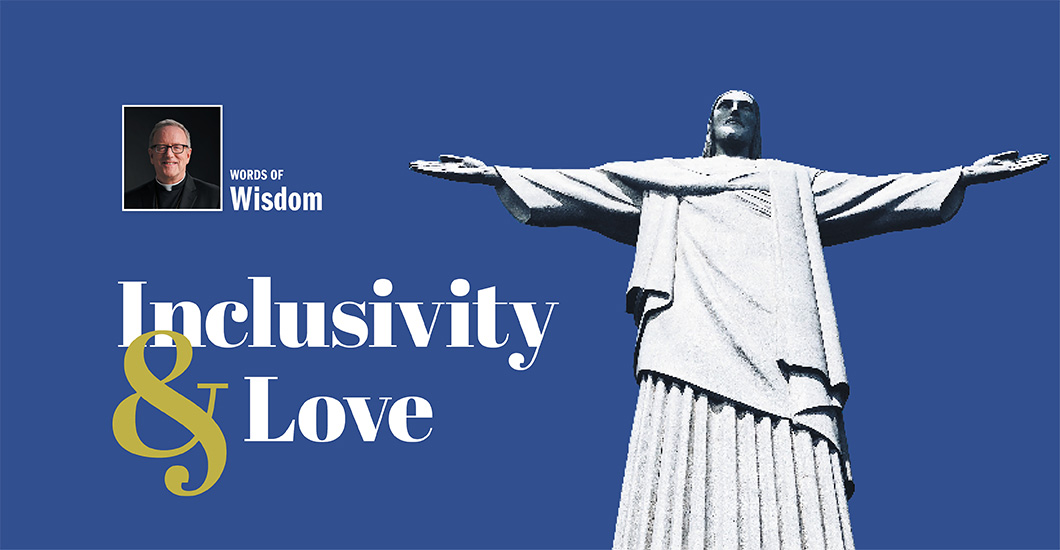
The other night, I had the privilege of participating in one of the listening sessions for the continental phase of the Synodal process. The basis for our discussion was a lengthy document produced by the Vatican after it had compiled data and testimony from all over the Catholic world. As I have been studying and speaking about synodality, I very much enjoyed the exchange of views. But I found myself increasingly uneasy with two words that feature prominently in the document, and that dominated much of our discussion— namely, “inclusivity” and “welcoming.”
Again and again, we hear that the Church must become a more inclusive and welcoming place for a variety of groups: women, LGBT+ people, the divorced and civilly remarried, etc. But I have yet to come across a precise definition of either term. What exactly would a welcoming and inclusive Church look like? Would it always reach out to everyone in a spirit of invitation? If so, the answer seems obviously to be yes. Would it always treat everyone, no matter their background, ethnicity, or sexuality, with respect and dignity? If so, again, the answer is yes. Would such a Church always listen with pastoral attention to the concerns of all? If so, affirmative. But would a Church exhibiting these qualities never pose a moral challenge to those who would seek entry? Would it ratify the behavior and lifestyle choices of anyone who presented him or herself for admission? Would it effectively abandon its own identity and structuring logic so as to accommodate any and all who come forward? I hope it is equally evident that the answer to all those questions is a resounding no. The ambiguity of the terms is a problem that could undermine much of the Synodal process.
In order to adjudicate this matter, I would suggest that we look not so much to the environing culture of the present day but to Christ Jesus. His attitude of radical welcome is nowhere on clearer display than in his open-table fellowship, that is to say, his consistent practice—countercultural in the extreme—to eat and drink not only with the righteous but
also with sinners, with Pharisees, tax collectors, and prostitutes. These meals of sacred fellowship Jesus even compared to the banquet of heaven. Throughout His public ministry, Jesus reached out to those considered unclean or wicked: the woman at the well, the man born blind, Zacchaeus, the woman caught in adultery, the thief crucified at his side, etc. So, there is no question that He was hospitable, gracious, and yes, welcoming to all.
By the same token, this inclusivity of the Lord was unambiguously and consistently accompanied by his summons to conversion. Indeed, the first word out of Jesus’ mouth in his inaugural address in the Gospel of Mark is not “Welcome!” but rather “Repent!” To the woman caught in adultery, He said, “Go and sin no more”; after meeting the Lord, Zacchaeus promised to change his sinful ways and compensate lavishly for his misdeeds; in the presence of Jesus, the good thief acknowledged his own guilt; and the risen Christ compelled the chief of the Apostles, who had three times denied Him, three times to affirm his love.
In a word, there is a remarkable balance in the pastoral outreach of Jesus between welcome and challenge, between outreach and a call to change. This is why I would characterize His approach not simply as “inclusive” or “welcoming” but rather as loving. Thomas Aquinas reminds us that to love is “to will the good of the other.” Accordingly, one who truly loves another reaches out in kindness, to be sure, but at the same time, he does not hesitate, when necessary, to correct, to warn, even to judge. My mentor, Francis
Cardinal George was once asked why he disliked the sentiment behind the song “All Are Welcome.” He responded that it overlooked the simple fact that, though all are indeed welcome in the Church, it is “on Christ’s terms, not their own.”
An overall concern that I have, very much related to the consistent use of the terms “welcoming” and “inclusivity,” is the trumping of doctrine, anthropology, and real theological argument by sentiment, or to put it a bit differently, the tendency to psychologize the matters under consideration. The Church doesn’t prohibit homosexual acts because it has an irrational fear of homosexuals, nor does it refuse communion to those in irregular marriage arrangements because it gets its kicks out of being exclusive; nor does it disallow women’s ordination because grumpy old men in power just can’t stand women. For each of these positions, it articulates arguments based on Scripture, philosophy, and the theological tradition, and each has been ratified by the authoritative teaching of bishops in communion with the pope. To throw all these settled teachings into question because they don’t correspond to the canons of our contemporary culture would be to place the Church into real crisis. And I sincerely do not believe that this shaking of the foundations is what Pope Francis had in mind when he called for a synod on synodality.
'